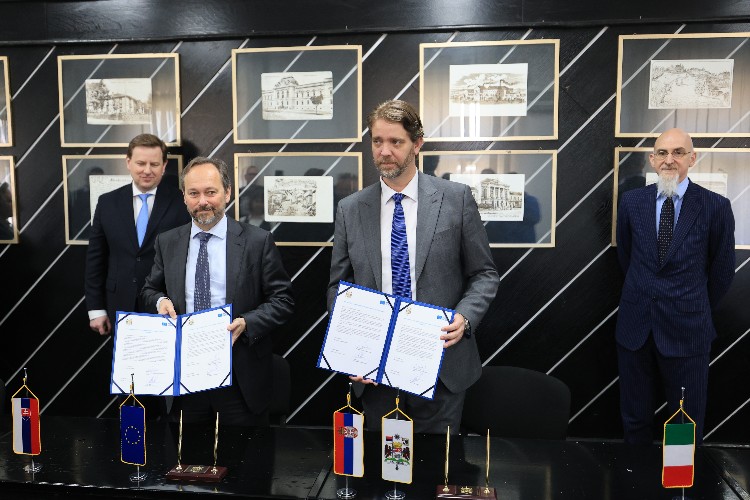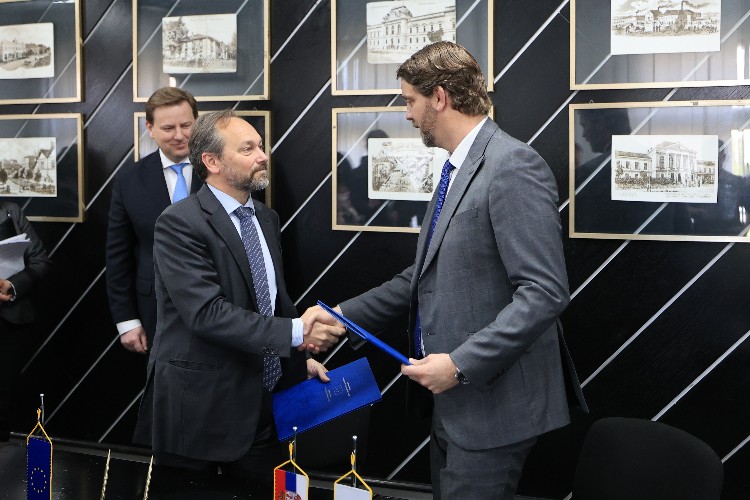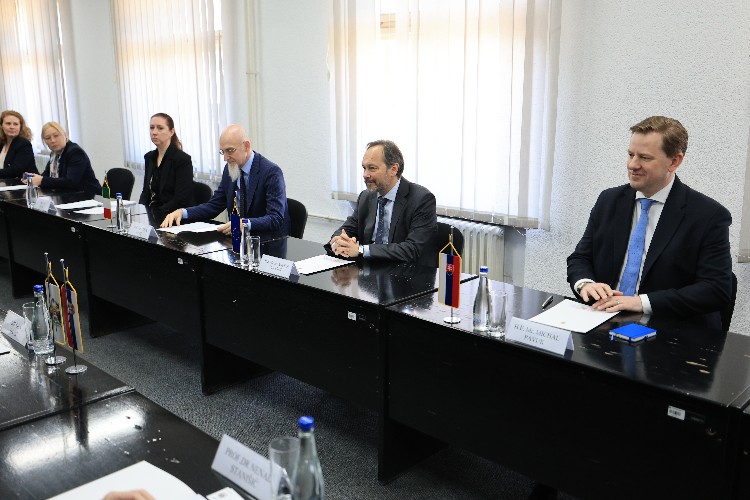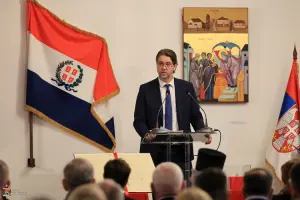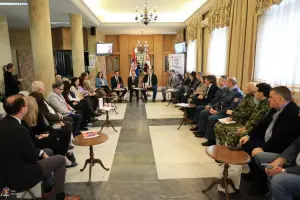Ambassador of the European Union in Serbia, Emanuele Giaufret and Mayor Nikola Dašić signed a Memorandum of Cooperation on the occasion of the opening of the European House in Kragujevac, which will be the fourth such center in Serbia. The Memorandum was signed during the visit of a high delegation to Kragujevac, which included Luca Gori, Ambassador of Italy and Michal Pavuk, Ambassador of Slovakia.
By signing the Memorandum and by opening the European House, we wanted to be present in Kragujevac, which is (beside Belgrade, Novi Sad and Niš) an important regional center, bearing in mind the importance of cooperation in various spheres between Serbia and the European Union. It is important that such a center exists here as a place where we will be able to bring European Union closer to the citizens and show everything that the European Union can do, what it does and what we can do together, said Ambassador Giaufret. He also announced that the renovation of the facility will begin in a few months so that the European House could be open next year.
The European Union and Kragujevac already have a developed strong relationship, several implemented projects, numerous activities that promote economic cooperation, which is very developed here, Giaufret said, recalling that the EU is the main economic partner of Serbia, with which 40 billion euros of exchange was recorded last year. Many European companies invest in Serbia and we will continue to develop and expand that cooperation, not only with state authorities but also with the private sector. Speaking about the Growth Plan for the Western Balkans as a major EU program that opens up new opportunities both for Serbia and its citizens, and which implies better integration with the EU of the entire Western Balkans with a single EU market, additional financial resources and regional integration, the EU ambassador said that it is important to understand everything well, because the plan provides new opportunities that should be used as much as possible at the central and local level.
Expressing satisfaction that he has the opportunity to host such a high-ranking delegation, Mayor Nikola Dašić emphasized that the European Union has already invested around 2.4 million euros in Kragujevac for joint projects with a total value of around 4.2 million euros. These are significant funds with which we have implemented a number of projects, such as the Pedestrian Bridge on the Lepenica river, and the famous “Koš”in the Grand Park, but there is much more ahead of us. That is why the Ambassador Giaufret's statement that we can expect more help from the European Union in the future and the message that, as a city and as a country, we continue to strive for accession to the European Union, are encouraging. We already have over 20 prepared projects, and one of the most significant is the opening of the European House in the city center. It will be a facility in which we will present our cooperation with the European Union in several ways and enable the people of Kragujevac to become familiar with the values of that heritage and the cultures that are intertwined in it, said Dašić and thanked their Excellencies for the support they have been providing us for a long period of time, showing us that we can rely on them as true partners.
The Ambassador of Italy, Luca Gori, pointed out that today's visit is an opportunity to show how the EU works cohesively with its members with the common goal of Serbia joining the EU as soon as possible, as well as how strong the economic ties are between the Republic of Serbia and the European Union. Italy has extremely strong economic ties with Serbia, and the presence of Italian companies is large, especially in this region. We intend to continue to invest in Serbia not only in the existing, traditional sectors, but also in new ones that have additional technological value and are a priority, both for us and for the Republic of Serbia, said Gori.
Slovakia's ambassador, Michal Pavuk, said that his country is a good example of everything that Europe can do for a country on the road to European integration, and that Serbia has Slovakia's full support in that process. The EU is not only concerned with capital cities, but also with smaller towns and cities, and it is important that we all contribute to that process, as well as reap benefits from it, said Pavuk.



